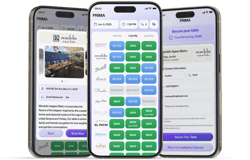Own the rendering stack end to end. Architect WebGL or WebGPU systems, build the asset pipeline, and make complex boards feel smooth at 60 to 120 fps. Partner with product and design. Mentor engineers. Write clear design docs and land them.
Compensation
$225K – $280K + Offers Equity
Own the rendering architecture for the canvas
Lead the architecture of the rendering stack and make it capable of handling large, complex boards with ease. GPU upload scheduling and resource lifetime.Keep interaction smooth at scale
Profile CPU and GPU. Reduce draw calls and overdraw. Control memory and GC. Hit p95 frame time at or below 16 ms on complex boards.Build the asset pipeline
Design how images and assets flow through the system so they appear quickly and stay smooth in use.Move heavy work off the main thread
Protect responsiveness by shifting expensive work away from the main thread. Use the right tools to handle intensive operations without blocking the UI.Make collaboration fast
Keep shared boards responsive. Design the system so collaboration feels instant regardless of team size or network conditions.Install quality guardrails that scale
Set clear quality guardrails. Create systems that keep performance high as the product grows.Lead and multiply
Drive reviews and roadmaps. Mentor seniors into future tech leads. Raise the conversation in design reviews.
Problems you will tackleRealtime sessions with many active users and a busy render loop
GPU-backed image generation that competes with interactivity
Boards with hundreds to thousands of assets that must remain fluid
Bundle weight, asset loading, and elimination of long tasks in the browser
Deciding what belongs on CPU, GPU, or WASM and setting clear boundaries
7 plus years building graphics-heavy clients or engines, with at least 3 years in WebGL, WebGPU, or similar APIs
Deep understanding of real-time rendering and performance optimization
Strong TypeScript skills and a grasp of browser performance fundamentals
Experience with moving intensive tasks into the right execution layer such as workers or WASM
Fluency with profiling tools and a product mindset backed by clear writing
Intro (30m): mutual fit, role and impact.
Architectural deep-dive (60–75m): a real Vizcom problem where you drive the trade-offs.
Hands-on working session (90m): pair on a small, realistic slice.
Cross-functional chat (30m): product and design collaboration.
Founder/CTO conversation (30–45m): values, scope, expectations.
References and offer.
We are a small team with high ownership. We are design centric and obsessed with speed and feel. We write things down. We operate what we build and we learn from incidents.
Top Skills

What We Do
Building tools that shorten the distance between having ideas and bringing them to life.
https://linktr.ee/vizcom_

.png)






